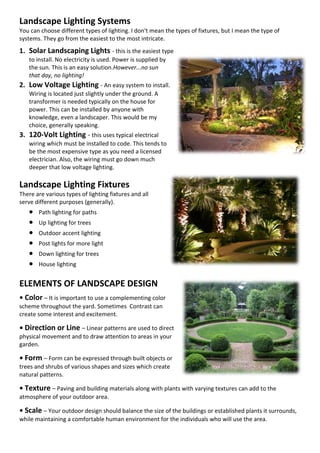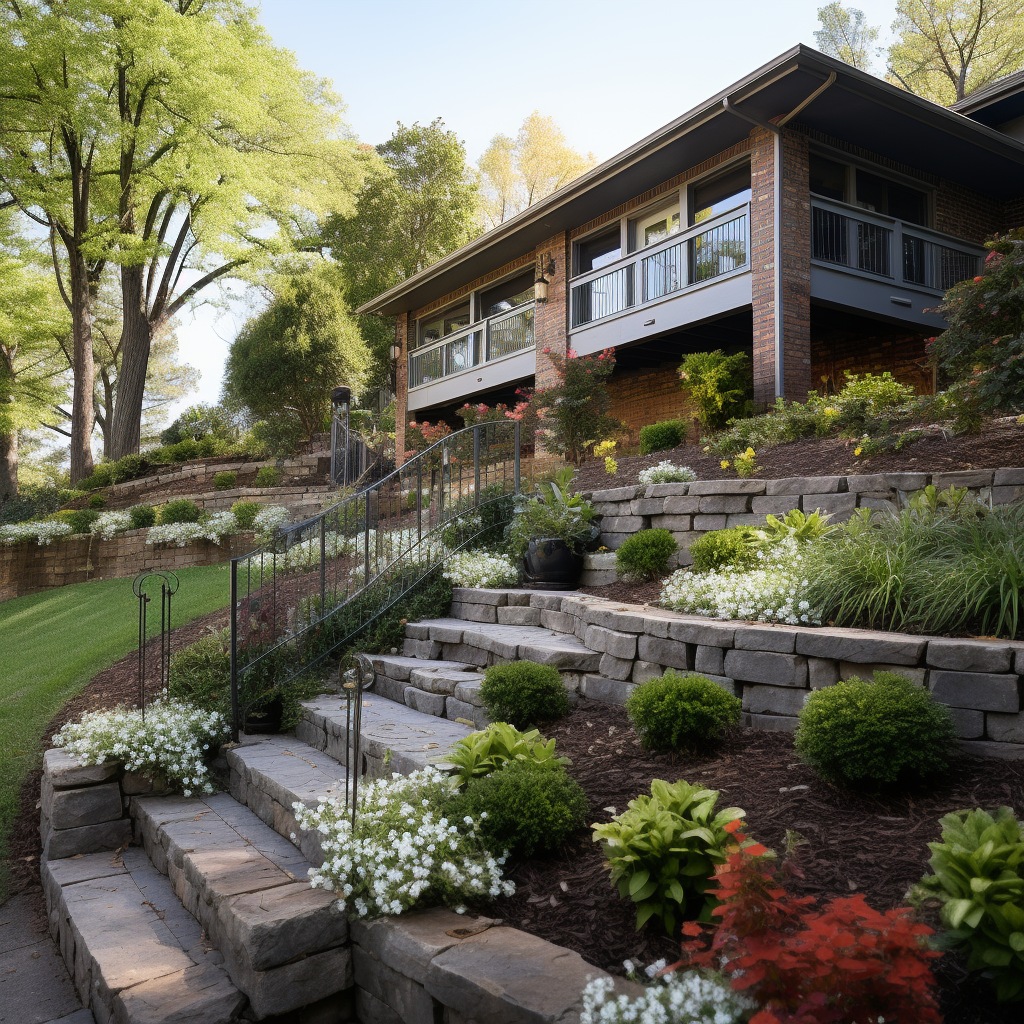Get This Report on Hilton Head Landscapes
Table of ContentsThe Best Guide To Hilton Head LandscapesRumored Buzz on Hilton Head LandscapesAn Unbiased View of Hilton Head LandscapesThe 10-Minute Rule for Hilton Head LandscapesSome Known Factual Statements About Hilton Head Landscapes Excitement About Hilton Head LandscapesThe 10-Second Trick For Hilton Head Landscapes
Line produces all kinds and patterns and can be made use of in a range of ways in the landscape. Line in the landscape is created by the side between two products, the outline or silhouette of a type, or a long direct attribute. Lines are an effective tool for the developer due to the fact that they can be made use of to produce a limitless variety of shapes and types, and they manage motion of the eye and the body.

Lines in the landscape. The properties of lines figure out just how individuals react to the landscape, both mentally and literally.
The Ultimate Guide To Hilton Head Landscapes
Straight lines are most usually located in hardscape edges and product. Curved lines develop a casual, all-natural, loosened up personality that is connected much more with nature and unbalanced equilibrium. Rounded lines move the eye at a slower speed and include enigma to the space by producing surprise sights. Upright lines move the eye up, making a space feel larger.
Upright lines in the landscape consist of high, narrow plant product, such as trees, or tall frameworks, such as an arbor or a bird house on a pole. Straight lines move the eye along the ground plane and can make a room feel larger. Low lines are extra suppressed and develop a feeling of rest or repose.
3 Simple Techniques For Hilton Head Landscapes
Low lines are created by low garden wall surfaces, pathways, and short hedges. Lines are used to attract types on a plan. In strategy sight, they specify plant beds and hardscape areas. Lines are also produced by the upright kinds of constructed attributes and plant material. There are three main line kinds that develop form in the landscape: bedlines, hardscape lines, and plant lines.
Bedlines link plant product to your house and hardscape because the eye complies with the line, moving the stare via the landscape. Hardscape lines are created by the side of the hardscape, which marks the developed structure. Line can also be produced by long and narrow products, such as a fencing or wall surface.
The Buzz on Hilton Head Landscapes
Form is located in both hardscape and plants, and it is usually the dominant visual element that spatially arranges the landscape and usually determines the design of the yard. The type of frameworks, plant beds, and yard ornaments likewise establishes the general form motif of the yard. Official, geometric kinds consist of circles, squares, and polygons.
Plants produce type in the garden with their describes or silhouettes, however kind can likewise be defined by a gap or adverse area between plants - bluffton landscaping (https://dzone.com/users/5166843/h1tnhdlndscps.html). Circles can be cycles, or they can be separated right into fifty percent circles or circle segments and integrated with lines to create arcs and tangents
7 Simple Techniques For Hilton Head Landscapes
Circles are a strong layout form because the eye is always attracted to the facility, which can be made use of to stress a focal point or connect various other forms. Circular kinds in hardscape and yard panels.
The square type can additionally be fractional and pre-owned consistently to produce a grid pattern. Unlike circles, squares are more powerful on the sides, which can be lined up or overlapped to develop distinct patterns and more complex forms.
Twisting lines frequently simulate the natural program of rivers or streams and can be called smooth lines with deeply rounded undulations. Twisting lines (Number 3) function well for paths, plant bedlines, and completely dry stream beds. Meandering lines can include interest and secret to a yard by leading viewers around corners to find new views and spaces.
Hilton Head Landscapes Fundamentals Explained

Number 5. Fragmented edges: tipping rocks in path. Type is one of the most enduring high quality of a plant (Landscaping bluffton sc). https://moz.com/community/q/user/h1tnhdlndscps?_=1719959081810. Usual plant forms are well established and standard, as form is the most consistent and well-known feature of plants. Kind can additionally be produced through the massing of plants, where the overall mass produces a different form than an individual plant.
A highly contrasting kind must be used with careone or 2 job well as a centerpiece, however as well many develop disorder. All-natural plant kinds, rather than over-trimmed kinds, should develop the mass of the structure. The importance of total form is essentially depending on the viewing perspectivethe kind of a tree can appear quite different to an individual standing under the canopy versus checking out the tree from a range in an open field.
Rumored Buzz on Hilton Head Landscapes
Plant forms also produce and define deep space or open spaces in between the plants, creating either convex or scooped kinds in deep spaces. High-arching tree branches usually produce a concave open space under the branches, and a rounded canopy with low branches loads the space to create a convex form in the open room under the tree.
